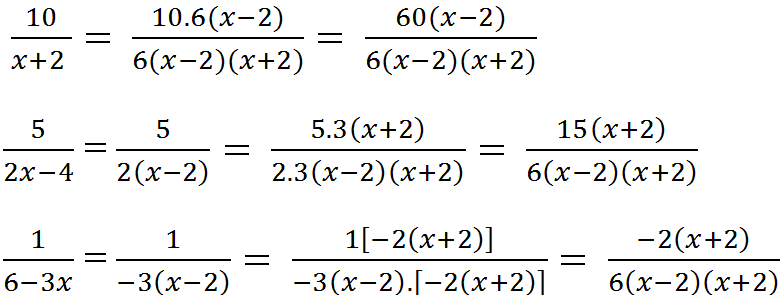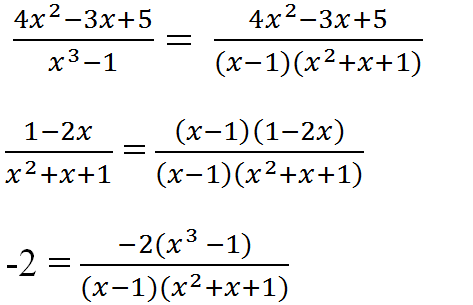Quy đồng mẫu thức các phân thức sau 4 x 2 - 3 x + 5 x 3 - 1 ; 2 x x 2 + x + 1
PB
Những câu hỏi liên quan
quy đồng mẫu thức các phân thức a) dfrac{1}{2x^3y}:dfrac{2}{3xy^2z^3}:dfrac{5}{4yz}b) dfrac{x+1}{10x^3-40x} và dfrac{5}{8x^3+16x^2}bài 2 áp dụng quy tắc đổi dấu hãy quy đồng mẫu thức các phân thứcdfrac{2-x}{3x-3x^2} và dfrac{x^2-2}{4x^5-4x^2}giúp mik với mik cần gấp
Đọc tiếp
quy đồng mẫu thức các phân thức a) \(\dfrac{1}{2x^3y}\):\(\dfrac{2}{3xy^2z^3}\):\(\dfrac{5}{4yz}\)
b) \(\dfrac{x+1}{10x^3-40x}\) và \(\dfrac{5}{8x^3+16x^2}\)
bài 2 áp dụng quy tắc đổi dấu hãy quy đồng mẫu thức các phân thức
\(\dfrac{2-x}{3x-3x^2}\) và \(\dfrac{x^2-2}{4x^5-4x^2}\)
giúp mik với mik cần gấp
quy đồng mẫu thức các phân thức a) dfrac{1}{2x^3y}: dfrac{2}{3xy^2z^3}:dfrac{5}{4yz}b) dfrac{x+1}{10x^3-40x} và dfrac{5}{8x^3+16x^2}bài 2 áp dụng quy tắc đổi dấu hãy quy đồng mẫu thức các phân thứcdfrac{2-x}{3x-3x^2} và dfrac{x^2-2}{4x^5-4x^2}
Đọc tiếp
quy đồng mẫu thức các phân thức a) \(\dfrac{1}{2x^3y}:\) \(\dfrac{2}{3xy^2z^3}\):\(\dfrac{5}{4yz}\)
b) \(\dfrac{x+1}{10x^3-40x}\) và \(\dfrac{5}{8x^3+16x^2}\)
bài 2 áp dụng quy tắc đổi dấu hãy quy đồng mẫu thức các phân thức
\(\dfrac{2-x}{3x-3x^2}\) và \(\dfrac{x^2-2}{4x^5-4x^2}\)
Bài 2:
a: \(\dfrac{1}{2x^3y}=\dfrac{6yz^3}{12x^3y^2z^3}\)
\(\dfrac{2}{3xy^2z^3}=\dfrac{2\cdot4x^2}{12x^3y^2z^3}=\dfrac{8x^2}{12x^3y^2z^3}\)
Đúng 0
Bình luận (0)
Quy đồng mẫu thức các phân thức sau (có thể áp dụng quy tắc đổi dấu với một phân thức để tìm mẫu thức chung thuận tiện hơn)
a) \(\dfrac{4x^2-3x+5}{x^3-1},\dfrac{1-2x}{x^2+x+1},-2\)
b) \(\dfrac{10}{x+2},\dfrac{5}{2x-4},\dfrac{1}{6-3x}\)
a) Tìm MTC: x3 – 1 = (x – 1)(x2 + x + 1)
Nên MTC = (x – 1)(x2 + x + 1)
Nhân tử phụ:
(x3 – 1) : (x3 – 1) = 1
(x – 1)(x2 + x + 1) : (x2 + x + 1) = x – 1
(x – 1)(x2+ x + 1) : 1 = (x – 1)(x2 + x + 1)
Qui đồng:
b) Tìm MTC: x + 2
2x – 4 = 2(x – 2)
6 – 3x = 3(2 – x)
MTC = 6(x – 2)(x + 2)
Nhân tử phụ:
6(x – 2)(x + 2) : (x + 2) = 6(x – 2)
6(x – 2)(x + 2) : 2(x – 2) = 3(x + 2)
6(x – 2)(x + 2) : -3(x – 2) = -2(x + 2)
Qui đồng:
Đúng 0
Bình luận (1)
quy đồng mẫu thức của các phân thức sau:
4x*2-3x+5/x*3-1 và 2x/x*2+x+1 ; 6/x-1
MTC : ( x - 1 )( x2 + x + 1 )
Ta có : \(\frac{4x^2-3x+5}{x^3-1}=\frac{4x^2-3x+5}{\left(x-1\right)\left(x^2+x+1\right)}\)
\(\frac{2x}{x^2+x+1}=\frac{2x\left(x-1\right)}{\left(x-1\right)\left(x^2+x+1\right)}=\frac{2x^2-2x}{\left(x-1\right)\left(x^2+x+1\right)}\)
\(\frac{6}{x-1}=\frac{6\left(x^2+x+1\right)}{\left(x-1\right)\left(x^2+x+1\right)}=\frac{6x^2+6x+6}{\left(x-1\right)\left(x^2+x+1\right)}\)
Hnay mới học thì hnay trả lời nhá :P
\(\frac{4x^2-3x+5}{x^3-1};\frac{2x}{x^2+x+1}\)
Ta có : \(x^3-1=\left(x-1\right)\left(x^2+x+1\right)\)
\(x^2+x+1=x^2+x+1\)
MTC : \(\left(x-1\right)\left(x^2+x+1\right)\)
\(\frac{4x^2-3x+5}{x^3-1}=\frac{4x^2-3x+5}{\left(x-1\right)\left(x^2+x+1\right)}\)
\(\frac{2x}{x^2+x+1}=\frac{2x\left(x-1\right)}{\left(x-1\right)\left(x^2+x+1\right)}=\frac{2x^2-2x}{\left(x-1\right)\left(x^2+x+1\right)}\)
\(\frac{2x}{x^2+x+1};\frac{6}{x-1}\)
Ta có : \(x^2+x+1=x^2+x+1\)
\(x-1=x-1\)
MTC : \(\left(x^2+x+1\right)\left(x-1\right)=x^3-1\)
\(\frac{2x}{x^2+x+1}=\frac{2x\left(x-1\right)}{\left(x^2+x+1\right)\left(x-1\right)}=\frac{2x^2-2x}{x^3-1}\)
\(\frac{6}{x-1}=\frac{6\left(x^2+x+1\right)}{\left(x-1\right)\left(x^2+x+1\right)}=\frac{6x^2+6x+6}{x^3-1}\)
Quy đồng mẫu các phân thức sau:
\(\frac{x^2-4}{x^2+2x}\) và \(\frac{x}{x-2}\)
\(\dfrac{x^2-4}{x^2+2x}=\dfrac{\left(x-2\right)\left(x+2\right)}{x\left(x+2\right)}=\dfrac{x-2}{x}=\dfrac{\left(x-2\right)^2}{x\left(x-2\right)}\)
\(\dfrac{x}{x-2}=\dfrac{x^2}{x\left(x-2\right)}\)
Đúng 3
Bình luận (1)
Quy đồng mẫu thức các phân thức sau x + 1 x 4 - 2 x 2 ; x x 4 - 4 x 2 + 4
quy đồng mẫu thức của các phân thức
\(\dfrac{1}{x+2};\dfrac{-3x}{x-2};\dfrac{3}{x^2-4x+4}\)
\(\dfrac{-1}{2x+2};\dfrac{3}{2-2x};\dfrac{5}{4x^2+4x+1}\)
cho mình hỏi là giữa khác phân số với nhua là phải có dấu như là công, trừ, nhân hay chia chứ?
Đúng 1
Bình luận (0)
Câu 1 Quy đồng mẫu thức của các phân thức sau::(2 điểm)
a/ \(\dfrac{3}{4x^3y^2}\) và \(\dfrac{2}{3xy^3}\) b/ \(\dfrac{5}{x^2-6x+9}\) và \(\dfrac{3}{x^2-3x}\)
a) MTC: \(12x^3y^3\)
\(\dfrac{3}{4x^3y^2}=\dfrac{3\cdot3y}{4x^3y^2\cdot3y}=\dfrac{9y}{12x^3y^3}\)
\(\dfrac{2}{3xy^3}=\dfrac{2\cdot4x^2}{3xy^3\cdot4x^2}=\dfrac{8x^2}{12x^3y^3}\)
b) MTC: \(x\left(x-3\right)^2\)
\(\dfrac{5}{x^2-6x+9}=\dfrac{5}{\left(x-3\right)^2}=\dfrac{5x}{x\left(x-3\right)^2}\)
\(\dfrac{3}{x^2-3x}=\dfrac{3}{x\left(x-3\right)}=\dfrac{3\left(x-3\right)}{x\left(x-3\right)^2}=\dfrac{3x-9}{x\left(x-3\right)^2}\)
Đúng 1
Bình luận (0)
Quy đồng mẫu thức các phân thức sau: a) 1/x^2y và 3/xy b) x/(x^2+2xy+y^2) và 2x/(x^2+xy)
a: 1/x^2y=1/x^2y
3/xy=3x/x^2y
b: \(\dfrac{x}{x^2+2xy+y^2}=\dfrac{x}{\left(x+y\right)^2}\)
\(\dfrac{2x}{x^2+xy}=\dfrac{2}{x+y}=\dfrac{2x+2y}{\left(x+y\right)^2}\)
Đúng 2
Bình luận (1)
Quy đồng mẫu thức các phân thức sau:
4
x
-
x
2
x
x
+
3
;
x
-
3
3
x
x
+
1
Đọc tiếp
Quy đồng mẫu thức các phân thức sau: 4 x - x 2 x x + 3 ; x - 3 3 x x + 1
Mẫu thức chung: 3x(x + 3)(x + 1)
Ta có

Đúng 0
Bình luận (0)









